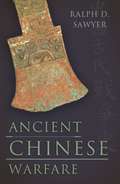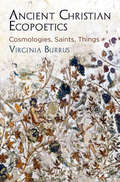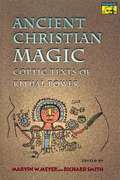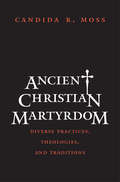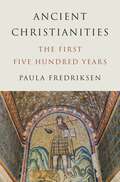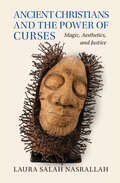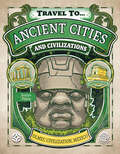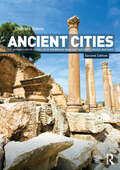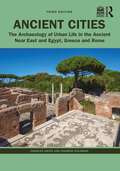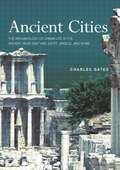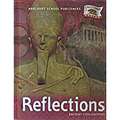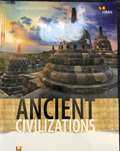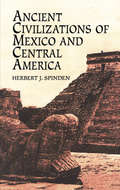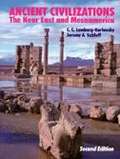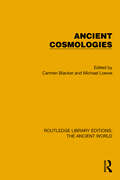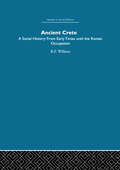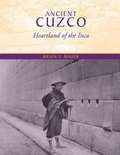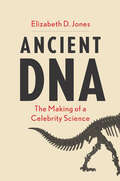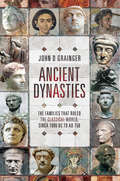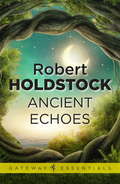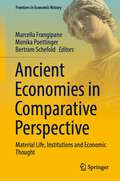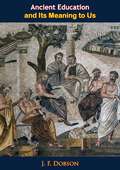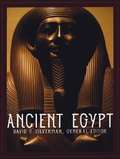- Table View
- List View
Ancient Chinese Warfare
by Ralph D. SawyerThe history of China is a history of warfare. Rarely in its 3,000-year existence has the country not been beset by war, rebellion, or raids. Warfare was a primary source of innovation, social evolution, and material progress in the Legendary Era, Hsia dynasty, and Shang dynasty--indeed, war was the force that formed the first cohesive Chinese empire, setting China on a trajectory of state building and aggressive activity that continues to this day. In Ancient Chinese Warfare, a preeminent expert on Chinese military history uses recently recovered documents and archaeological findings to construct a comprehensive guide to the developing technologies, strategies, and logistics of ancient Chinese militarism. The result is a definitive look at the tools and methods that won wars and shaped culture in ancient China.
Ancient Christian Ecopoetics: Cosmologies, Saints, Things (Divinations: Rereading Late Ancient Religion)
by Virginia BurrusIn our age of ecological crisis, what insights—if any—can we expect to find by looking to our past? Perhaps, suggests Virginia Burrus, early Christianity might yield usable insights. Turning aside from the familiar specter of Christianity's human-centered theology of dominion, Burrus directs our attention to aspects of ancient Christian thought and practice that remain strange and alien. Drawn to excess and transgression, in search of transformation, early Christians creatively reimagined the universe and the human, cultivating relationships with a wide range of other beings—animal, vegetable, and mineral; angelic and demonic; divine and earthly; large and small.In Ancient Christian Ecopoetics, Burrus facilitates a provocative encounter between early Christian theology and contemporary ecological thought. In the first section, she explores how the mysterious figure of khora, drawn from Plato's Timaeus, haunts Christian and Jewish accounts of a creation envisioned as varyingly monstrous, unstable, and unknowable. In the second section, she explores how hagiographical literature queers notions of nature and places the very category of the human into question, in part by foregrounding the saint's animality, in part by writing the saint into the landscape. The third section considers material objects, as small as portable relics and icons, as large as church and monastery complexes. Ancient Christians considered all of these animate beings, simultaneously powerful and vulnerable, protective and in need of protection, lovable and loving. Viewed through the shifting lenses of an ancient ecopoetics, Burrus demonstrates how humans both loomed large and shrank to invisibility, absorbed in the rapture of a strange and animate ecology.
Ancient Christian Magic: Coptic Texts of Ritual Power
by Richard Smith Marvin Meyer Neal KelseyThe main purpose of this volume is to present in English translation a representative selection of 135 Coptic texts of ritual power.
Ancient Christian Martyrdom
by Candida R MossThe importance of martyrdom for the spread of Christianity in the first centuries of the Common Era is a question of enduring interest. In this innovative new study, Candida Moss offers a radically new history of martyrdom in the first and second centuries that challenges traditional understandings of the spread of Christianity and rethinks the nature of Christian martyrdom itself. Martyrdom, Moss shows, was not a single idea, theology, or practice: there were diverse perspectives and understandings of what it meant to die for Christ. Beginning with an overview of ancient Greek, Roman, and Jewish ideas about death, Moss demonstrates that there were many cultural contexts within which early Christian views of martyrdom were very much at home. She then shows how distinctive and diverging theologies of martyrdom emerged in different ancient congregations. In the process she reexamines the authenticity of early Christian stories about martyrs and calls into question the dominant scholarly narrative about the spread of martyrdom in the ancient world.
Ancient Christianities: The First Five Hundred Years
by Paula FredriksenHow, over the course of five centuries, one particular god and one particular Christianity came to dominate late Roman imperial politics and piety The ancient Mediterranean teemed with gods. For centuries, a practical religious pluralism prevailed. How, then, did one particular god come to dominate the politics and piety of the late Roman Empire? In Ancient Christianities, Paula Fredriksen traces the evolution of early Christianity—or rather, of early Christianities—through five centuries of Empire, mapping its pathways from the hills of Judea to the halls of Rome and Constantinople. It is a story with a sprawling cast of characters: not only theologians, bishops, and emperors, but also gods and demons, angels and magicians, astrologers and ascetics, saints and heretics, aristocratic patrons and millenarian enthusiasts. All played their part in the development of what became and remains an energetically diverse biblical religion.The New Testament, as we know it, represents only a small selection of the many gospels, letters, acts of apostles, and revelations that circulated before the establishment of the imperial church. It tells how the gospel passed from Jesus, to the apostles, thence to Paul. But by using our peripheral vision, by looking to noncanonical and paracanonical texts, by availing ourselves of information derived from papyri, inscriptions, and archaeology, we can see a different, richer, much less linear story emerging. Fredriksen brings together these many sources to reconstruct the lively interactions of pagans, Jews, and Christians, tracing the conversions of Christianity from an energetic form of Jewish messianism to an arm of the late Roman state.
Ancient Christians and the Power of Curses
by Laura Salah NasrallahAncient Christians and their non-Christian contemporaries lived in a world of 'magic.' Sometimes, they used curses as ritual objects to seek justice from gods and other beings; sometimes, they argued against them. Curses, and the writings of those who polemicized against curses, reveal the complexity of ancient Mediterranean religions, in which materiality, poetics, song, incantation, and glossolalia were used as technologies of power. Laura Nasrallah's study reframes the field of religion, the study of the Roman imperial period, and the investigation of the New Testament and ancient Christianity. Her approach eschews disciplinary aesthetics that privilege the literature and archaeological remains of elites, and that defines curses as magical materials, separable from religious ritual. Moreover, Nasrallah's imaginative use of art and 'research creations' of contemporary Black painters, sculptors, and poets offer insights for understanding how ancient ritual materials embedded into art work intervene into the present moment and critique injustice.
Ancient Cities and Civilizations (Travel to...)
by DulingTake a trip through time to see how ancient cities and civilizations thrived and fell long ago as you Travel to… Ancient Cities and Civilizations!Part of the Travel to… Children’s Book Series, this 48-page nonfiction book takes you back in time to ancient Rome, Egypt, Mesopotamia, Greece, Mexico, and other places in ancient history. Learn about their societies, their architecture, the rise and fall of power, and more.World History Book Features:Before- and after-reading activitiesExtension activityGlossaryAbout Rourke Educational Media:We proudly publish respectful and relevant nonfiction and fiction titles that represent our diverse readers, and are designed to support reading on a level that has no limits!
Ancient Cities: The Archaeology of Urban Life in the Ancient Near East and Egypt, Greece and Rome
by Charles GatesAncient Cities surveys the cities of the Ancient Near East, Egypt, and the Greek and Roman worlds from the perspectives of archaeology and architectural history, bringing to life the physical world of ancient city dwellers by concentrating on evidence recovered from archaeological excavations. Urban form is the focus: the physical appearance and overall plans of the cities, their architecture and natural topography, and the cultural and historical contexts in which they flourished. Attention is also paid to non-urban features such as religious sanctuaries and burial grounds, places and institutions that were a familiar part of the city dweller's experience. Objects or artifacts that represented the essential furnishings of everyday life are discussed, such as pottery, sculpture, wall paintings, mosaics and coins. Ancient Cities is unusual in presenting this wide range of Old World cultures in such comprehensive detail, giving equal weight to the Preclassical and Classical periods, and in showing the links between these ancient cultures. User-friendly features include: use of clear and accessible language, assuming no previous background knowledge lavishly illustrated with over 300 line drawings, maps, and photos historical summaries, further reading arranged by topic, plus a consolidated bibliography and comprehensive index new to the second edition: a companion website with an interactive timeline, chapter summaries, study questions, illustrations and a glossary of archaeological and historical terms. Visit the website at https://routledgetextbooks.com/textbooks/9780415498647/ In this second edition, Charles Gates has comprehensively revised and updated his original text, and Neslihan Yılmaz has reworked her acclaimed illustrations. Readers and lecturers will be delighted to see a new chapter on Phoenician cities in the first millennium BC, and new sections on Göbekli Tepe, the sensational Neolithic sanctuary; Sinope, a Greek city on the Black Sea coast; and cities of the western Roman Empire. With its comprehensive presentation of ancient Mediterranean and Near Eastern cities, its rich collection of illustrations, and its new companion website, Ancient Cities will remain an essential textbook for university and high school students across a wide range of archaeology, ancient history, and ancient Near Eastern, Biblical, and classical studies courses.
Ancient Cities: The Archaeology of Urban Life in the Ancient Near East and Egypt, Greece, and Rome
by Charles Gates Andrew GoldmanThe third edition of Ancient Cities surveys the cities of the Ancient Near East, Egypt, and the Greek, Etruscan, and Roman worlds from the perspectives of archaeology and architectural history, bringing to life the physical world of ancient city dwellers by concentrating on archaeological evidence.Urban form is the focus: the physical appearance and overall plans of cities, their architecture and natural topography, and the cultural and historical contexts in which they flourished. Attention is also paid to non-urban features such as religious sanctuaries and burial grounds, places and institutions that were a familiar part of the city dweller’s experience. Objects or artifacts that furnished everyday life are discussed, such as writing systems, pottery, sculpture, wall paintings, mosaics, and coins. Ancient Cities is unusual in presenting this wide range of Old World cultures in such comprehensive detail, giving equal weight to the Preclassical and Classical periods, and in showing the links between these ancient cultures. In this new edition, in which Andrew Goldman has joined Charles Gates in updating the volume, readers and lecturers will be delighted to see a major revision of the chapters on Greek cities in South Italy and Sicily, the Etruscans, the development of the capital city, Rome, during the Republic as well as the Empire, and the end of the ancient city.This new edition includes several new and updated user-friendly features, such as: Clear and accessible language, assuming no previous background knowledge Lavishly illustrated, with almost 350 line drawings, maps, and photographs, including new contributions from Neslihan Yılmaz Tekman adding to her already acclaimed illustrations Suggestions for further reading for each chapter A companion website with images, study guides, and an interactive timeline. With its comprehensive presentation of ancient Mediterranean and Near Eastern cities, its rich collection of illustrations, and its companion website, Ancient Cities remains an essential textbook for university and high school students across a wide range of archaeology, ancient history, and ancient Near Eastern, Biblical, and Classical Studies courses.
Ancient Cities: The Archaeology of Urban Life in the Ancient Near East and Egypt, Greece, and Rome
by Charles GatesAncient Cities surveys the cities of the ancient Near East, Egypt, and the Greek and Roman worlds from an archaeological perspective, in their cultural and historical contexts.
Ancient Civilizations
by Michael J. Berson Priscilla H. Porter Margaret Hill Tyrone C. Howard Bruce E. Larson Julio MorenoThis book of Ancient Civilizations is divided into six units, covering Early Humankind; Mesopotamia, Egypt, and Kush; The Ancient Hebrews; The Ancient Greeks; Early Civilizations of India and China; and The Development of Rome.
Ancient Civilizations (California Edition, Grade #6)
by Diane HartIn this book you will learn about the great civilizations of the ancient world. You will find out who built the great pyramids of Egypt, how the rulers of China and Rome conquered huge empires, and why powerful ideas such as the Ten Commandments and Greek democracy shaped the world.
Ancient Civilizations (HMH Social Studies)
by Houghton Mifflin HarcourtHMH Social Studies: Ancient Civilizations: Student Edition 2019
Ancient Civilizations of Mexico and Central America (Native American)
by Herbert J. SpindenFrom the archaic period, through the great Mayan civilization and the "Middle" civilizations of Olmecs, Toltecs and others, to the glory of the Aztecs, this classic study offers a comprehensive survey of the extent and variety of pre-Columbian civilizations in the New World. Profusely illustrated with 47 black-and-white plates, 86 text figures. New Introduction by Bruce E. Byland. Bibliography. Index, Map. Diagram of American Chronology.
Ancient Civilizations: The Near East And Mesoamerica
by C. C. Lamberg-Karlovsky Jeremy A. SabloffAn introduction to and overview of New World and Old World civilizations through a comparative examination of well-known archaeological areas. This edition (first, 1979) includes an expanded final chapter discussing current debates about the development of ancient civilizations. For undergraduate level students. Annotation c. by Book News, Inc. , Portland, Or.
Ancient Cosmologies (Routledge Library Editions: The Ancient World)
by Michael Loewe Carmen BlackerIn Ancient Cosmologies (1975) nine eminent scholars seek to answer the question, what was the shape of the universe imagined by those ancient peoples to whom all modern knowledge of geography and astronomy was inaccessible? How did the ancient Egyptians, Babylonians, Jews, Indians, Chinese, Arabs, Greeks and Norsemen conceive the form of the cosmos which accommodated not only the known face of the earth and the visible heavenly bodies but also those other worlds which it was deemed necessary to locate comprehensibly in space – the realms of the dead, both blessed and damned, and the countries inhabited by gods and demons?
Ancient Crete: From Early Times Until the Roman Occupation (Phoenix Press Ser.)
by R. F. WillettsFirst published in 2006. Routledge is an imprint of Taylor & Francis, an informa company.
Ancient Cuzco: Heartland of the Inca
by Brian S. BauerThe Cuzco Valley of Peru was both the sacred and the political center of the largest state in the prehistoric Americas-the Inca Empire. From the city of Cuzco, the Incas ruled at least eight million people in a realm that stretched from modern-day Colombia to Chile. Yet, despite its great importance in the cultural development of the Americas, the Cuzco Valley has only recently received the same kind of systematic archaeological survey long since conducted at other New World centers of civilization. Drawing on the results of the Cuzco Valley Archaeological Project that Brian Bauer directed from 1994 to 2000, this landmark book undertakes the first general overview of the prehistory of the Cuzco region from the arrival of the first hunter-gatherers (ca. 7000 B. C. ) to the fall of the Inca Empire in A. D. 1532. Combining archaeological survey and excavation data with historical records, the book addresses both the specific patterns of settlement in the Cuzco Valley and the larger processes of cultural development. With its wealth of new information, this book will become the baseline for research on the Inca and the Cuzco Valley for years to come.
Ancient DNA: The Making of a Celebrity Science
by Elizabeth D JonesThe untold story of the rise of the new scientific field of ancient DNA research, and how Jurassic Park and popular media influenced its development Ancient DNA research—the recovery of genetic material from long-dead organisms—is a discipline that developed from science fiction into a reality between the 1980s and today. Drawing on scientific, historical, and archival material, as well as original interviews with more than fifty researchers worldwide, Elizabeth Jones explores the field&’s formation and explains its relationship with the media by examining its close connection to de-extinction, the science and technology of resurrecting extinct species. She reveals how the search for DNA from fossils flourished under the influence of intense press and public interest, particularly as this new line of research coincided with the book and movie Jurassic Park. Ancient DNA is the first account to trace the historical and sociological interplay between science and celebrity in the rise of this new research field. In the process, Jones argues that ancient DNA research is more than a public-facing science: it is a celebrity science.
Ancient Dynasties: The Families that Ruled the Classical World, circa 1000 BC to AD 750
by John D. GraingerA guide to the over 150 families that ruled the Classical world, from the 10th century BC to the 8th century AD, from western Europe to central Asia. Ancient Dynasties is a unique study of the ruling families of the ancient world known to the Greeks and Romans. The book is in two parts. The first offers analysis and discussion of various features of the ruling dynasties (including the leading families of republican Rome). It examines patterns, similarities and contrasts, categorizes types of dynasty and explores common themes such as how they were founded and maintained, the role of women, and the various reasons for their decline. The second part is a catalog of all the dynasties (over 150 of them) known to have existed between approximately 1000 BC and AD 750 from the Atlantic Ocean to Baktria (roughly modern Afghanistan). It provides genealogical tables as well as information on where and when they held power. Altogether, Ancient Dynasties offers an invaluable reference to ancient history buffs interested in the families that wielded power in the Classical world.
Ancient Echoes (Gateway Essentials #310)
by Robert HoldstockJack Chatwin has visions, which leave tangible evidence - sounds and smells, which linger afterwards. What he sees are two primitive figures, with painted faces - Greyface and Greenface, a brother and sister. He calls them bullrunners. John Garth is a city dowser, searching for the mythical pre-Roman city of Glanum. He hopes to find an entryway to the elusive city beneath Exburgh, Jack's home town. And he thinks Jack's bullrunners may be connected to Glanum . . . Years later, Jack, now grown up, agrees to take part in experiments to investigate his bullrunners - until Greyface, the male, breaks free of Jack and takes corporeal form. The bullrunner kidnaps Jack's young daughter so Jack will force Greenface to follow her brother-husband, even against her own wishes. Though Greyface returns the daughter, he keeps a shadow of her, which takes on a life of its own. If Jack refuses to co-operate, the shadow will drain his daughter's vitality and personality - and her very future.The story of Jack's search for Greenface is interwoven with the connections between the bullrunners and the mystical city of Glanum in this resonant tale of ancient mythic wonder.
Ancient Economies in Comparative Perspective: Material Life, Institutions and Economic Thought (Frontiers in Economic History)
by Monika Poettinger Bertram Schefold Marcella FrangipaneThis book investigates the economic organization of ancient societies from a comparative perspective. By pursuing an interdisciplinary approach, including contributions by archaeologists, historians of antiquity, economic historians as well as historians of economic thought, it studies various aspects of ancient economies, such as the material living conditions including production technologies, etc.; economic institutions such as markets and coinage; as well as the economic thinking of the time. In the process, it also explores the comparability of economic thought, economic institutions and economic systems in ancient history. Focusing on the Ancient Near East as well as the Mediterranean, including Greece and Rome, this comparative perspective makes it possible to identify historical permanencies, but also diverse forms of social and political organization and cultural systems. These institutions are then evaluated in terms of their capacity to solve economic problems, such as the efficient use of resources or political stability. The first part of the book introduces readers to the methodological context of the comparative approach, including an evaluation of the related historiographical tradition. Subsequent parts discuss a range of development models, elements of economic thinking in ancient societies, the role of trade and globalization, and the use of monetary and financial instruments, as well as political aspects.
Ancient Education and Its Meaning to Us
by J. F. DobsonWHAT is the true object of education? Should the educator aim at training the largest possible number of individuals to be of the greatest possible service to the State, up to the limit of the capability of each, or should he rather try to give each one an opportunity to develop fully the best qualities which he possesses, regardless of whether this method of training may or may not seem to be of immediate practical use either to the person or to the community? The question, in most ages and most countries, does not admit of a simple answer. It came nearest to being answered in Sparta, which of all nations known to history paid least attention to the individual as such, and in Republican Rome, which, though not so rigid as Sparta, regarded education as concerned mainly with the production of useful citizens. In Rome, at least before the great development which followed on the introduction of Greek ideas, and in Sparta throughout her history, this social side of education was predominant.In other Greek states there was at all times more of individualism. The Ionians of Asia Minor represent the extreme of the opposite attitude, and even democratic Athens did not wish to have all her citizens turned out of the same mould, but, while giving equal opportunities to all, neither expected nor wished that everyone should follow the same line or reach the same goal... Plato, for instance, who was deeply influenced by Spartan ideals, attached the highest importance to the State, and though, in his Republic, he would have the individuals highly trained in many branches of learning which in Sparta or early Rome would have been rejected as either superfluous or harmful, it has been often pointed out that the individuals in his State pass a laborious life of service and self-sacrifice in order to assure the greatest happiness to the greatest number; while his strictures on poetry and other imitative arts shew further that the individual is to him of little importance.
Ancient Egypt
by David P. SilvermanThe ancient Egyptians created some of the world's most beautiful art and architecture. To this day, this ancient civilization--which produced the great pyramids, the riddle of the Sphinx, and the riches of Tutankhamun--exerts a strong hold on our imaginations. Now, in Ancient Egypt, eminent Egyptologist David P. Silverman and a team of leading scholars explore the cultural wealth of this civilization in a series of intriguing and authoritative essays based on the latest theories and discoveries. Illustrated with more than 200 superb color photographs, maps, and charts, this book illuminates the vivid and powerful symbolic images of this fascinating culture--from pyramids and temples to priests and rituals; from hieroglyphic writing to daily life by the Nile; and from temple carvings to the cult of the dead. Correcting the popular misconception of the Egyptians as a death-obsessed people, the book uses the most recent historical research and archaeological finds to illuminate the routines of daily life in royal, elite, priestly circles, as well as at lower levels of society. We learn, for example, that despite the monochromatic appearance of most temple ruins today, in ancient times they would have been colorful, even gleaming structures; that the title "Pharaoh" derives from the Egyptian phrase per aa, which means "great house" and was originally a reference to the royal palace; that temples employed all manner of part-time and full-time personnel, from farmers and carpenters to scribes, jewelers, and keepers of livestock; and that Egyptian law viewed women as equal to men, and they could, in some cases, wield considerable influence.
